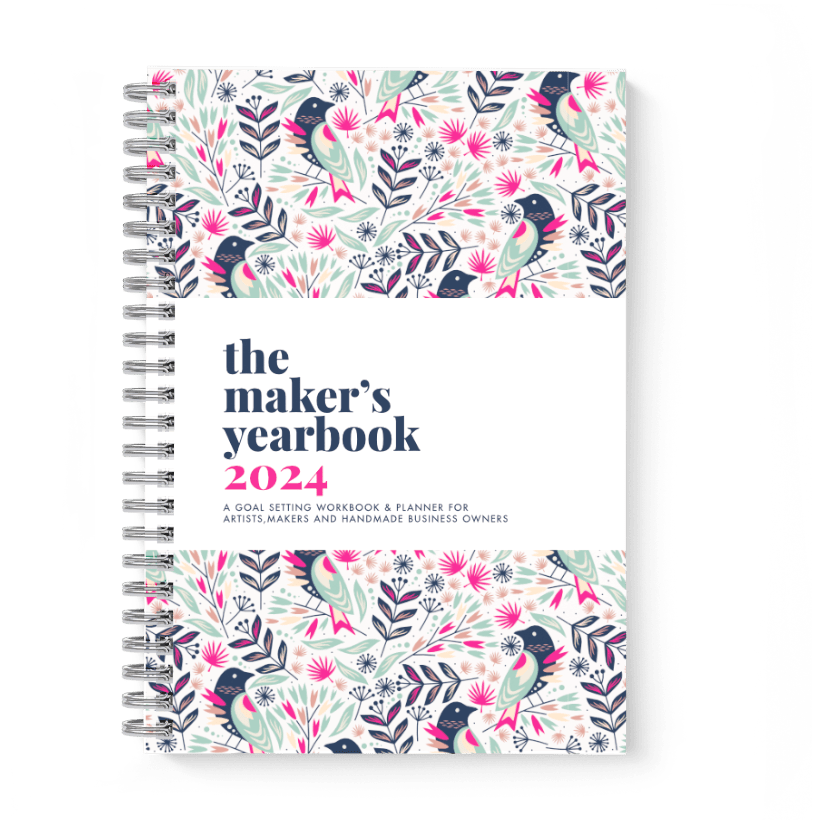Running your own business is a very different experience than working for someone else.
And, for most of us, our previous work lives did not provide us with many of the skills we need to succeed as a business owner.
As an employee, you need to respond to the tasks you’re given to do today. You don’t have full autonomy to change your role if you’re not enjoying it. And you may have to deal with ways of doing the boring work that are slow and frustrating.
When we run our own businesses, we are freed from all of those constraints. But sometimes it’s difficult for us to change what we’ve been so used to doing.
In this post, I’ll share some habits you can develop that not only set you up for success, but will help you to gradually step into the role of a business owner and let go of some of the old ways of working that won’t serve you now.
Proactive Working
What does this mean?
It means that every day (or at least as often as possible) you decide for yourself what you’re going to spend your work time doing.
That sounds like it should be easy, but most of us spend most of our time reacting to what happens each day.
Here’s an example:
When you sit down to work on any given day, what’s the first thing that you do? If you’re like most of us you probably check your email and social media.
And then you react to what’s happening in your inbox.
Maybe you’ve got an email from a customer asking where their order is, so you go and hunt down the tracking information, find out where it is and then send them a reply. If you haven’t got good policies in place, maybe you’ll spend quite a while wondering what you should do if it doesn’t arrive, maybe you’ll ask in a few Facebook Groups and then spend the rest of the day writing up some new terms and conditions.
Another example. Maybe you receive an email with an offer to buy a course on creating engaging content on Instagram. You take a look at the sales page, but you wonder if they’ve got some free content you can use instead, so you go and check out the course creator’s blog and social media. That leads you down a rabbit hole of topics and you read for a few hours and write yourself a long to do list of things to work on, from those blog posts.
In both cases, you worked all day. You weren’t slacking off. The things you were doing were also probably pretty useful.
But you reacted to what came at you, instead of deciding what was most important for you to work on.
When you work in a reactive way like this, you are tied to what is urgent and what someone else puts in front of you. You don’t work to your own priorities, you work to someone else’s.
Some days that doesn’t matter, but over time it leads to the non-urgent, but really important things not getting done. They never get to the top of your list unless they suddenly become urgent.
You didn’t get your customer service terms and conditions done because they were boring and difficult and you had lots of other things to do, but then they became urgent because a customer asked about them, and you had to scramble to get them done, and anything else you planned had to be put to one side.
You’ve written a list of things to do to improve your Instagram content but you haven’t implemented any of them. If you work in a reactive way tomorrow as well, you probably never will.
This way of working, where you’re always being pulled towards things you didn’t plan is exhausting. It means that you don’t work to your own strategy.
And that prevents you from learning. The experience of running a business is a huge learning curve and to be successful you need to know how to come up with an idea, test it out and then learn from it and adapt.
You will do that over and over again, and it makes you really good at knowing how to turn your gifts into money that you can use to give yourself the lifestyle you want.
But reactive working blocks that learning. You never get to set up and test out your experiments because you’re working on things that other people decide are important.
Learning to choose what you’re going to work on each day, and then protecting those tasks from interruption can make a really big difference to not only how much success you have in your business, but also how you feel while you’re doing it.
My top tips for ensuring you do at least some proactive work every day:
1. Have regular strategy sessions to decide your goals and then break them down into smaller tasks that are action-oriented
2. Spend a few minutes each morning picking a couple of your tasks to get done today, and do them before you check your inbox or social media. The Maker’s Yearbook can help with this.
3. Set yourself a time of day to respond to customer service emails and do them once a day. If you find them too distracting, filter them into a folder or use a separate email address so that you don’t see them in your inbox.
Routines for the Boring Stuff
Let’s face it, there’s a lot of stuff that is part of running a business that really isn’t that much fun. Bookkeeping, website maintenance, budgeting, writing emails, packing and shipping orders.
Most of us love the creating, and we love the way people feel when they receive our work, but we’re not so keen on the logistics of running the business.
There’s nothing wrong with that. We don’t have to love everything we do, as long as there is enough fulfilment and meaning in the work overall.
But we do still have to get these things done and there are ways to make it less painful. Let’s look at bookkeeping as an example.
I don’t think there are many of us who enjoy doing this work, and the busier and more successful we get, the more of it there is to do.
If you’ve ever sat down with a huge box of receipts to do your taxes at the very last moment, it’s probably an experience you don’t ever want to repeat, and you don’t have to.
Having a weekly finance routine can make this a lot less stressful and also make you feel much more in control of what’s happening with your money.
I call mine, Finance Friday, and even with a business with a lot of transactions every day I can get through it in a couple of hours. You may be able to do yours much more quickly.
I’d highly recommend that you use a checklist for all of the tasks that need to get done.
Here’s a basic routine for bookkeeping:
• Withdraw all funds from Paypal
• Check on bills to pay this week and make sure I’ve got them covered
• Enter all receipts into my bookkeeping spreadsheet or software
• Reconcile my bank account
• Transfer my pay to my personal account
You can include links to all of the accounts, software and spreadsheets so that you can get to them quickly and easily. No more hunting through your computer or cloud storage’s annoying filing system for that spreadsheet you always use but can never find.
And the good news is that, as you follow this routine regularly, you can improve it and make it even faster.
We may not like doing these tasks, but they have to be done, and getting them done quickly and easily means that we can get back to doing the things we do enjoy.
Regular check ins
If you’re a Maker’s Yearbook user, you’ve already got a monthly review that will ask you all kinds of questions about your money, your wellbeing, your painful lessons and your successful products.
Reviewing the way things are going is so important. Many of us are already tracking some kinds of numbers in our business. Maybe you’re tracking sales or followers on social media or email subscribers.
But are you spending time each month asking yourself what is going well and what is not going as well as you’d like?
Many makers get really worried that they will end up not enjoying something they previously loved, once they turn it into a business.
And it’s not only makers that need to worry about that. It’s easy for any of us to follow the path of reactive working straight towards something that doesn’t inspire us, and may actually make us actively miserable.
The flip side of that is that, because we’re hyper focused on whether we’re enjoying ourselves all the time, we don’t allow for the fact that learning to be a business owner is always going to be kind of uncomfortable and we’re not going to enjoy every part of it.
That can mean that sometimes we give up too soon.
So the better option is to let go of monitoring and worrying about how we feel each day, and instead have a regular time when we explore where we are, what we’re enjoying, what we’re struggling with and what we’d like to be doing less of.
It’s a way to assess what your business is giving to you, and asking of you, so that if you decide to change direction it’s not just a reaction to discomfort, but a well thought out decision.
That process of coming up with an idea, testing it and then assessing the progress needs a time to be set aside for a review. If you review things too early, you’ll probably give up before it has the time it needs. If you don’t review at all, you can get stuck doing something that isn’t going to give you the outcome you want.
Blank Slate, Every Day
I think this is the most important routine to establish in your business and it’s something that is at the heart of the Maker’s Yearbook.
Planning out weeks and months at a time, leads to to-do lists that get rolled over from day to day to day and eventually become so unmanageable that we stop looking at them.
So if we want our planning to work for us, we need to have a system that is flexible enough to adapt when our energy levels are different, or our responsibilities are different, or our concentration levels are different.
We have businesses that meld into our day to day lives so we can’t ignore our lives when we’re figuring out how to get the work done.
So, instead of filling up your whole week right now, get into the habit of assessing yourself every morning and, with a blank slate, figure out what are the most important tasks to work on today.
You’ll keep your big to-do list, but it’s there to give you options to choose from and you’re only going to select 2 or 3 things each day.
Anything you don’t finish doesn’t get rolled over to tomorrow but it goes back onto the big to-do list and then tomorrow, you choose your most important tasks again. If this is still most important, then it goes onto the slate for today. If not, it stays on the to-do list until it is the most important thing.
This way every day is a fresh start and you’re always doing the most important things – it leaves space for you to let go of something that previously seemed important but now maybe isn’t, or for something that was bigger than you expected and now needs to be done over a longer period of time.
So which of these habits are you going to implement in your business? Remember – don’t try everything all at once. It can take some time to establish a new habit so work at one, until it becomes part of your routine, and then add another.








